 October 12, 2017 John E. Ross, KD8IDJ, Editor
| |||||||
Vice President Visits "Force of 50," Red Cross Invites Volunteers to Extend Stay Vice President Mike Pence visited "Force of 50" volunteers and emergency responders at the Puerto Rico Emergency Operations Center (PREOC) in San Juan's Convention Center on October 6. "He gave a very motivating speech, and our very own Gary Sessums, KC5QCN, shook his hand," volunteer Valerie Hotzfeld, NV9L, reported.
Puerto Rico Section Emergency Coordinator Juan Sepulveda, KP3CR, is better prepared to assist, now that volunteers have delivered a radio and antenna to him in Lares. "This now gives us a local ham covering the Lares Medical Center and the hospital, so our ARRL American Red Cross Amateur Radio operator can cover the Casteñel hospital nearby," ARC volunteer Valerie Hotzfeld, NV9L, noted in a team update. Sepulveda has been coordinating the ARES efforts on the west side of the island since the recovery began.
Amateur Radio has continued to provide a link for the medical community in Puerto Rico. Volunteers have deployed to hospitals, including remote hospitals that are without communication. This week, the team relayed a request for Culebra Hospital, which reported that a generator fire had forced relocation to a nearby clinic. In addition, volunteers relayed a request from Culebra Hospital that it needs temporary housing from FEMA for necessary staff members who lost their homes in the hurricane. The team also relayed a message for Hima San Pablo Hospital in Fajardo, which needed specialized IV fluids for a 4-day-old infant. Rob Landon, KE8AMC, stationed at the hospital on Vieques, learned from the hospital administrator that they needed to evacuate dialysis patients, who require air conditioning that the hospital is unable to provide. "We made their day," said Hotzfeld. "They were not aware of our presence and were impressed with our communications capabilities."
An Amateur Radio operator has been assigned at Centro Medico (Medical Central) to provide communication between the center and other hospitals. "This happened just in time, because the Menonita (Mennonite) Hospital in Caguas had both generators fail," Hotzfeld said. The emergency room doctor at Medical Central and the ham embedded there, Juan Trujillo, N0PSF, coordinated with Dennis Perez, WP4Q, at the Mennonite Hospital in Caguas to transfer four critical patients to the Mennonite Hospital in Cayey. Volunteers at the EOC relayed a request from Guayana Hospital for snacks, water, and a generator. Their second generator was reported to be about to fail. They also relayed requests from hospitals for fuel and water, and they provided communication for fire departments contacting the EOC.
A dozen or so volunteers continue to handle traffic and relays from the EOC. The Red Cross deployed five radio operators to provide communication for its reunification teams. Safe and Well data collection continues at Red Cross shelters, and reunification work involves going out into areas that have no communication. The Amateur Radio operators on the island also passed a substantial volume of health-and-welfare traffic. Efforts continue toward resurrecting the devastated electrical power infrastructure in Puerto Rico, and 40 to 50 Puerto Rican radio amateurs have been assisting the power authority to maintain communication as it works to restore power. Hotzfeld; Puerto Rico Section Manager Oscar Resto, KP4RF; Corey, and Amateur Radio liaison to the FEMA ESF-2 Communications Task Force Gary Sessums, KC5QCN, traveled to Arecibo, Lares, and the Guajataca Dam to deliver bottled water as well as spare VHF radios to permit direct communication between Isabela and the dam, where infrastructure repairs are under way. A repeater has been delivered to Arecibo Observatory. Several team members stocked up on powdered milk, peanut butter, water, rice, canned fruits and vegetables, and bags of fresh apples, and delivered these to people in the Arecibo area.
The fire station in Guayama reported a complete lack of water, with people being turned away. One of the Amateur Radio volunteers was able to assist from the fire station in Juncos. Volunteer Joe Bassett, W1WCN, worked via relay with local operator Al Medina-Ramirez, NP3MR, to reestablish contact with an Army task force on Vieques Island. Army MARS operators were unable to get in touch with the task force dispatched to assist the island's hospital. Medina-Ramirez responded to a call from W1WCN to travel to the hospital and contact the task force, which was found safe and well and awaiting transport via helicopter, which had been delayed due to the weather. Amateur Radio operators at the EOC assisted Samaritan's Purse in providing a generator to power a repeater near Jayuya. Contact was provided to have local radio amateur WP4PNS meet Samaritan's Purse personnel to exchange the generator. FEMA has reported that only about 19% of cell telephone sites are operational, and 15% of customers have electrical power. The Salvation Team Emergency Radio Network (SATERN) stood down on October 11. -- Thanks to ARRL Puerto Rico SM Oscar Resto, KP4RF; Valerie Hotzfeld, NV9L; ESF-2 Amateur Radio Liaison Gary Sessums, KC5QCN, and National SATERN Liaison Bill Feist, WB8BZH ARRL Expresses Gratitude for Outpouring of Ham Aid Donations ARRL thanks the Amateur Radio community for its generosity in support of the ARRL Ham Aid Fund, which is making it possible to provide relief and recovery communications in Puerto Rico. Overall, there have been more than 600 donations to the Ham Aid program in response to a call from ARRL President Rick Roderick, K5UR, and nearly $125,000 has come in from clubs and individuals. Several Amateur Radio retailers and manufacturers also have stepped up to donate needed equipment. Roderick said he was amazed at the overwhelming response, including those who answered his call to join the "Force of 50" now deployed in Puerto Rico.
The list of those offering their generosity and support is long and growing. Contributors include International Amateur Radio Union Region 2 (IARU R2), which donated two Ham Aid kits in addition to a monetary donation; the Yasme Foundation, which made a monetary contribution to the Ham Aid Fund and donated critical equipment, and the Northern California DX Foundation (NCDXF). Donations also came from the Orlando Amateur Radio Club (OARC) and from Orlando HamCation®. Amateur Radio dealers and retailers have made in-kind donations. Quicksilver Radio (QSR) has contributed antennas and accessories, Radiowavz has provided antennas, and Heil Sound Ltd. has donated headsets with cables. Other corporate and retail in-kind contributors include ABR Industries, AT&T, Icom America, Yaesu, Ham Radio Outlet (HRO), and DX Engineering.
Monetary donations also have arrived from the CW Operators Club (CWops); the SouthEastern DX and Contesting Organization (SEDCO), sponsor of W4DXCC; the Northern California Contest Club (NCCC); the Fort Myers Amateur Radio Club (FMARC); the Wahkiakum Amateur Radio Club; the North Shore Radio Club (NSARC), and the Steel City Amateur Radio Club (W3KWH). Ham Aid was created in 2005 in response to the need for equipment and resources to support the Amateur Radio response to hurricanes in the US and the Caribbean, and Ham Aid kits are in use throughout Puerto Rico for the Hurricane Maria relief and recovery effort. Ham Aid equipment will be needed for future disasters. "Your donation to Ham Aid will help us now, and contributions to Ham Aid are 100% tax deductible," President Roderick said. You can donate online (select "Ham Aid" from the Donation Form list), or by mail by printing a donation form and mailing it with your check payable to ARRL, noting "Ham Aid" on the memo line, to ARRL, 225 Main St., Newington, CT 06111 USA. Ham Radio Bridging the Gap in Wildfire-Stricken California More than a dozen wildfires in Northern California have damaged or destroyed cellular telephone and internet infrastructure in some areas, and Amateur Radio has helped to fill the communication gap. Mendocino County Sheriff Thomas Allman told news media on Tuesday, October 10, that damage to cell towers and fiber optic telephone and computer lines had left officials relying on Amateur Radio operators to communicate with area hospitals.
ARRL contacted Robin Carter, a resident of the Willits area in Mendocino County, who confirmed that ham radio operators were, until midweek, stationed at all North County hospitals and large nursing homes, supplementing the county's emergency communication system. She said cell and landline telephone service had been knocked out at her home, along with the fiber optic internet connection, although the family has satellite internet. She said internet service was at least temporarily restored on Wednesday. Her husband Mike Carter, KC6MGM, a Mendocino County Community Emergency Response Team (CERT) volunteer, had, until Wednesday, been staffing a station at Howard Memorial Hospital in Willits for 12 hours a day. Radio amateurs also assisted with communication at Ukiah Valley Medical Center in Ukiah; Northbrook Nursing Home in Willits; the Mendocino Coast Hospital in Fort Bragg, and Red Cross shelters at Ukiah High School and Willits High School, Robin Carter said. The Redwood Complex Fire, the northernmost of the fires, was responsible for the Mendocino County outages. The Atlas Fire in Solano and Napa counties is the largest and most disastrous wildfire. It covers more than 42,300 acres and was only 3% contained as of October 11. In Sonoma County, Sonoma County Radio Amateurs (SCRA) has been conducting an ARES Fire Watch Net to relay fire and emergency information on its repeater. Auxiliary Communication Service (ACS) Radio Officer Dan Ethen, WA6CRB, said a controlled Sonoma County Fire and Emergency Services RACES/ACS net is also active. In Solano County, radio amateurs are reported to be supporting shelter operations.
In Sonoma County, Sonoma County Radio Amateurs (SCRA) has been conducting an ARES Fire Watch Net to relay fire and emergency information on its repeater. Auxiliary Communication Service (ACS) Radio Officer Dan Ethen, WA6CRB, said a controlled Sonoma County Fire and Emergency Services RACES/ACS net is also active. In Solano County, radio amateurs are reported to be supporting shelter operations. The fast-moving, wind-driven blazes -- 18 large fires in all, according to FEMA -- have driven thousands from their homes, killed at least 2 dozen people, and destroyed more than 1,300 homes. FEMA said the fires cover some 150,000 acres in all. Some towns have been virtually leveled. Most of the wildfires are clustered around Santa Rosa, north of San Francisco. According to FEMA, some 106,000 residents are under mandatory evacuation orders, more than 36,500 homes are threatened, and 59 Red Cross and independent shelters are open with 5,117 evacuees. A state of emergency exists in Napa, Sonoma, Butte, Lake, Solano, Mendocino, Nevada, Orange, and Yuba counties. The California Emergency Operations Center is partially activated. California Department of Forestry and Fire Protection mobile communications centers (MCCs) are equipped with Amateur Radio stations, but it's not known if any hams have been deployed on any MCCs in the field for the current spate of wildfires. Read more. Hurricane Nets Activate for Nate The Hurricane Watch Net (HWN) and the VoIP Hurricane Net activated for Hurricane Nate last weekend. Both stood down on October 8. "Nate spared the New Orleans area any significant wind damage and storm-surge flooding, but pockets of tree and wire damage and wind gusts to hurricane force were recorded in parts of Mississippi and offshore oil platforms in the Louisiana coastal waters," said VoIP Hurricane Net Director of Operations Rob Macedo, KD1CY. "Storm surge values of 3-7 feet were recorded in portions of southern Alabama, southern Mississippi, and extreme southeast Louisiana."
Macedo said some pockets of structural damage were recorded in parts of Mississippi and Alabama from higher wind gusts in severe thunderstorms or possibly tornado activity. One tornado was spotted in Orange Beach, Alabama, by an Amateur Radio operator who was in the area, he said. The Doctor Will See You Now! "Dirty Transmitters" is the topic of the new (October 12) episode of the "ARRL The Doctor is In" podcast. Listen...and learn!
Every 2 weeks, your host, QST Editor-in-Chief Steve Ford, WB8IMY, and the Doctor himself, Joel Hallas, W1ZR, will discuss a broad range of technical topics. You can also e-mail your questions to [email protected], and the Doctor may answer them in a future podcast. Enjoy "ARRL The Doctor is In" on Apple iTunes, or by using your iPhone or iPad podcast app (just search for "ARRL The Doctor is In"). You can also listen online at Blubrry, or at Stitcher (free registration required, or browse the site as a guest) and through the free Stitcher app for iOS, Kindle, or Android devices. If you've never listened to a podcast before, download our beginner's guide. ARRL Headquarters Welcomes New Communication Manager Dave Isgur This week, ARRL Headquarters welcomed Dave Isgur, who will be the League's Communication Manager. A Boston-area native and 1979 graduate of Boston University with a bachelor's degree in journalism and a minor in economics, he brings to ARRL a rich background in journalism and public relations. Expect him to have a call sign after his name in the near future.
He joins the HQ staff after 19 years as the director of media relations at the University of Hartford, where he served as the university's chief spokesperson and wrote articles for alumni publications and student and faculty profiles for the school's website. A highlight of his time there came in 2015, when President Barack Obama spoke on campus, and Isgur had the opportunity to work with the White House on media relations for the event. Before that, Isgur worked for nearly 20 years as a reporter and editor at a variety of publications throughout New England. That included a stint in the 1990s when he was managing editor -- and later editor -- of Hartford Business Journal. He had first arrived in Hartford in 1990, to launch and manage a news bureau in Connecticut's capital for the Reuters International wire service. "Working for a wire service taught me a lot about how to craft tightly written stories under intense deadline pressures," Isgur recalled. He has earlier experience writing for journals targeting the insurance, banking, and real estate professions, and he was a reporter at general circulation weekly newspapers in Massachusetts, New Hampshire, and Maine. Isgur said he's a diehard fan of the Boston Red Sox as well as of horror-genre novelist Stephen King, and mystery and science fiction novels. ARRL Foundation Accepting Scholarship Applications The ARRL Foundation Scholarship program is now accepting applications from eligible applicants. The deadline to submit applications is January 31, 2018. All applicants must be FCC-licensed radio amateurs, and many scholarships have other specific requirements, such as intended area of study, ARRL Division, Section, or state, and license class.
Applicants should review all scholarship descriptions and check off the ones for which they are eligible. More information is on the ARRL Foundation Scholarship Program page. FCC Affirms Huge Fine in New York Interference Case The FCC has affirmed a huge fine of more than $400,000 on Jay Peralta, a Queens, New York, man who has admitted to making unauthorized transmissions on New York City Police Department (NYPD) radio frequencies, maliciously interfering with officers' communications. The FCC had sent Peralta a Notice of Apparent Liability (NAL) last April 14. Peralta, 20, is alleged to have transmitted false bomb threats, false claims of criminal activity involving firearms, false distress calls from purported NYPD officers, and threats against individual NYPD officers. The unauthorized transmissions began in 2016, according to the FCC.
The FCC has calculated the precise forfeiture at $404,166. The FCC said the transmissions occurred from April through August 2016. The NYPD subsequently provided the FCC with a written statement by Peralta, who is currently in custody pending trial for related charges, in which he acknowledged making nine unauthorized transmissions on the NYPD radio system, the FCC said. Read more. JOTA/JOTI Report More Than 2,500 Registered for October 20-22 Event Scouting's Jamboree-on-the-Air (JOTA) / Jamboree-on-the-Internet (JOTI) report that more than 2,500 have signed up to take part in the 2017 event over the October 20-22 weekend. This is the 60th JOTA, and there is still time to register. For those getting on the air, a Scout Station Scheduling site is available, as is a Scout Camps on the Air (SCOTA) page to register your own station and arrange contacts. Two Echolink conference nodes have been designated for Scout contacts -- *JOTA-365* (node 480809) and *JAMBO* (node 832996).
JOTA participating stations should take special care to avoid conflicting with any emergency response traffic activity under way in the Caribbean. In general, steer clear of any net traffic you might encounter. A potential conflict exists between PSK and the new FT8 mode on 18.100 MHz, the frequency recommended for both modes. FT8 is the predominant activity at 18.1 MHz right now, and JOTA organizers suggest looking for PSK contacts on either side of 18.100. Read more. In Brief...
The K7RA Solar Update Tad Cook, K7RA, Seattle, reports: The NOAA Space Weather Prediction Center (SWPC) has issued a minor (G1) geomagnetic storm watch through October 13, due to the anticipated arrival of a recurrent, polar-connected, positive polarity coronal hole high-speed wind stream. A minor geomagnetic storm can cause weak power grid fluctuations and may have minor impact on satellite operations. The primary impact area is north of 60° geomagnetic latitude. A G1 storm can affect migratory animals, and aurora is commonly visible at high latitudes, NOAA said.
Predicted solar flux is 70 on October 12-16; 72, 73, and 76 on October 17-19; 80 on October 20-31; 76 on November 1-5; 74 on November 6-14; 76 on November 15, and 80 on November 16-25. Predicted planetary A index is 30, 35, 25, 20, 10, 8, and 16 on October 12-18; 5 on October 19-23; 35 and 45 on October 24-25; 15 on October 26-27; 10 and 8 on October 28-29; 5 on October 30-31; 8 and 10 on November 1-2; 5 on November 3-5; 8, 25, 30, 36, 28, 16, and 8 on November 6-12; 5 on November 13-19, and 35, 45, 15, 15, 10, and 8 on November 20-25. Sunspot numbers for October 5-11 were 26, 22, 11, 0, 0, 0, and 0, with a mean of 8.4. The 10.7-centimeter flux was 84.7, 84.1, 79.6, 76.7, 72.3, 70.9, and 69.6, with a mean of 76.8. Estimated planetary A indices were 7, 9, 5, 4, 3, 4, and 30, with a mean of 8.9. Estimated mid-latitude A indices were 6, 6, 5, 3, 2, 13, and 21, with a mean of 8. Send me your reports and observations. Just Ahead in Radiosport
See the ARRL Contest Calendar for more information. For in-depth reporting on Amateur Radio contesting, subscribe to The ARRL Contest Update via your ARRL member profile e-mail preferences. Upcoming ARRL Section, State, and Division Conventions
Find conventions and hamfests in your area.
. .
Subscribe to...
Free of charge to ARRL members...
Find ARRL on Facebook! Follow us on Twitter, Snapchat @ARRLHQ, and Instagram! | |||||||
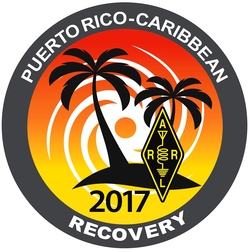 The American Red Cross (ARC) this week invited the Amateur Radio volunteers now in Puerto Rico to extend their duty tours. Members of the "Force of 50" deployed to Puerto Rico at the start of the month, all as ARC volunteers. ARRL Emergency Preparedness Manager Mike Corey, KI1U, joined the cadre of volunteers last week and hit the ground running. Nearly 2 dozen ARRL volunteers from the mainland and numerous local radio amateurs have been working in concert over the past couple of weeks, doing what needs to be done to help Puerto Rico to recover from hurricane devastation.
The American Red Cross (ARC) this week invited the Amateur Radio volunteers now in Puerto Rico to extend their duty tours. Members of the "Force of 50" deployed to Puerto Rico at the start of the month, all as ARC volunteers. ARRL Emergency Preparedness Manager Mike Corey, KI1U, joined the cadre of volunteers last week and hit the ground running. Nearly 2 dozen ARRL volunteers from the mainland and numerous local radio amateurs have been working in concert over the past couple of weeks, doing what needs to be done to help Puerto Rico to recover from hurricane devastation.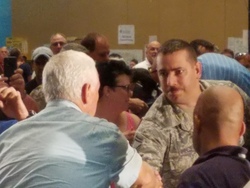
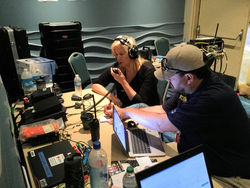
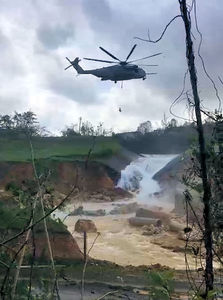
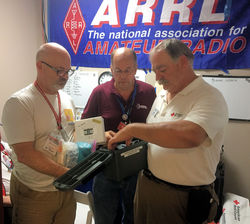
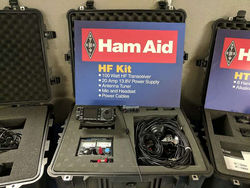 "The Amateur Radio community really came together in providing donations of equipment, funding, and personnel in response to the great need in Puerto Rico," Roderick said. "The scale of these efforts and the response is making history. This has got to be one of Amateur Radio's greatest moments. Our sincere thanks go to all involved."
"The Amateur Radio community really came together in providing donations of equipment, funding, and personnel in response to the great need in Puerto Rico," Roderick said. "The scale of these efforts and the response is making history. This has got to be one of Amateur Radio's greatest moments. Our sincere thanks go to all involved."
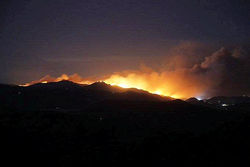
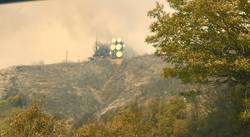
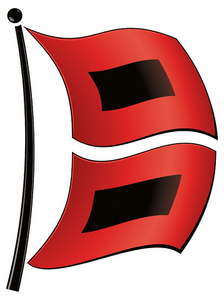 Nate was downgraded to a tropical storm after making a second landfall near Biloxi, Mississippi. During a 14-hour net activation, HWN members collected and forwarded ground-truth weather data from numerous reporting stations across the northern Gulf to the National Hurricane Center. "2017 has been a tough year for land-falling hurricanes," HWN Manager Bobby Graves, KB5HAV, said, noting that the Atlantic hurricane season continues through November 30.
Nate was downgraded to a tropical storm after making a second landfall near Biloxi, Mississippi. During a 14-hour net activation, HWN members collected and forwarded ground-truth weather data from numerous reporting stations across the northern Gulf to the National Hurricane Center. "2017 has been a tough year for land-falling hurricanes," HWN Manager Bobby Graves, KB5HAV, said, noting that the Atlantic hurricane season continues through November 30.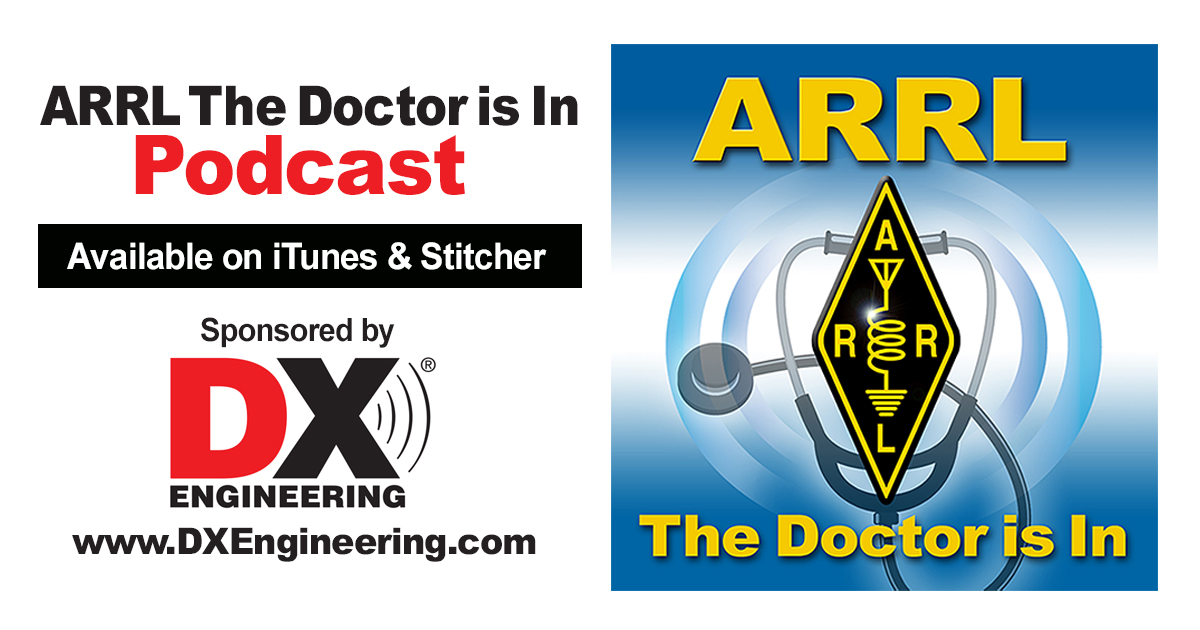 Sponsored by
Sponsored by 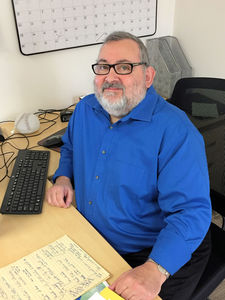 "I am enjoying it here and have found everyone to be very friendly and welcoming," Isgur said. "I am working on my ham radio license and have had an interest in Amateur Radio, as I have a few friends who are ham radio operators."
"I am enjoying it here and have found everyone to be very friendly and welcoming," Isgur said. "I am working on my ham radio license and have had an interest in Amateur Radio, as I have a few friends who are ham radio operators.".jpg) This year, the Foundation Board of Directors is offering several new scholarships. These include The Old Man International Sideband Society Scholarship; The K6GO Gale Olson and NA6MB Mike Bender Scholarship; The Harry A. Hodges, W6YOO, Scholarship; the Medical Amateur Radio Council (MARCO) Scholarship, and The Ladies Amateur Radio Association of Orange County Scholarship.
This year, the Foundation Board of Directors is offering several new scholarships. These include The Old Man International Sideband Society Scholarship; The K6GO Gale Olson and NA6MB Mike Bender Scholarship; The Harry A. Hodges, W6YOO, Scholarship; the Medical Amateur Radio Council (MARCO) Scholarship, and The Ladies Amateur Radio Association of Orange County Scholarship..jpg) "Mr. Peralta has not filed a response to the NAL," the FCC said in an October 10 Forfeiture Order (
"Mr. Peralta has not filed a response to the NAL," the FCC said in an October 10 Forfeiture Order (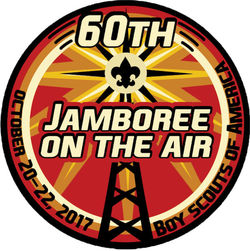 More Scout frequency information
More Scout frequency information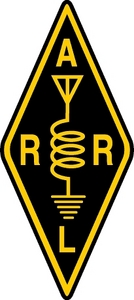 ARRL Executive Committee to Meet October 14 in Connecticut: The ARRL Executive Committee of the Board of Directors will meet on Saturday, October 14. ARRL President Rick Roderick, K5UR, will chair the session, which will hear reports from officers and the general counsel. Topping the agenda are FCC regulatory matters, including a review of enforcement issues and concerns, as well as open items with no FCC action since the July 2017 Board meeting. The Amateur Radio Parity Act of 2017 (HR 555) will be the focus when the discussion turns to legislative matters. The Executive Committee will hear a status report. The Committee will review pending action items including work in progress by committees, among them the Amateur Auxiliary Study Ad Hoc Committee, and will develop a plan to implement the recommendations of the Entry Level License Committee. The Committee also will recognize new ARRL Life Members. The Executive Committee is tasked by the ARRL Bylaws to address League matters between regular Board meetings.
ARRL Executive Committee to Meet October 14 in Connecticut: The ARRL Executive Committee of the Board of Directors will meet on Saturday, October 14. ARRL President Rick Roderick, K5UR, will chair the session, which will hear reports from officers and the general counsel. Topping the agenda are FCC regulatory matters, including a review of enforcement issues and concerns, as well as open items with no FCC action since the July 2017 Board meeting. The Amateur Radio Parity Act of 2017 (HR 555) will be the focus when the discussion turns to legislative matters. The Executive Committee will hear a status report. The Committee will review pending action items including work in progress by committees, among them the Amateur Auxiliary Study Ad Hoc Committee, and will develop a plan to implement the recommendations of the Entry Level License Committee. The Committee also will recognize new ARRL Life Members. The Executive Committee is tasked by the ARRL Bylaws to address League matters between regular Board meetings.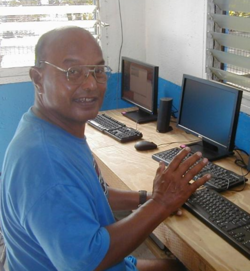 Noted Micronesian Radio Amateur Albert Haped, V63YAH: Albert Haped, V63YAH, of Ulithi Atoll, Miocronesia, died on October 3. An ARRL member, he was 64. Haped had been one of the "people on the other end" of daily contacts to the Federated States of Micronesia (FSM) that recipients of the ARRL International Humanitarian of the Year John Bush, KH6DLK/V63JB; Barbara Darling, NH7FY, and Richard Darling, AH7G, make almost daily. He was an island chief of Mangyang Island, one of the islands surrounding Ulithi Atoll. Before retiring, Haped was a teacher at Federai Elementary School. Haped was active during the recent Typhoon Maysak that hit FSM, especially during the recovery.
Noted Micronesian Radio Amateur Albert Haped, V63YAH: Albert Haped, V63YAH, of Ulithi Atoll, Miocronesia, died on October 3. An ARRL member, he was 64. Haped had been one of the "people on the other end" of daily contacts to the Federated States of Micronesia (FSM) that recipients of the ARRL International Humanitarian of the Year John Bush, KH6DLK/V63JB; Barbara Darling, NH7FY, and Richard Darling, AH7G, make almost daily. He was an island chief of Mangyang Island, one of the islands surrounding Ulithi Atoll. Before retiring, Haped was a teacher at Federai Elementary School. Haped was active during the recent Typhoon Maysak that hit FSM, especially during the recovery. 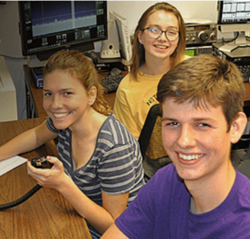 School Club Roundup Participants Reminded to Tune Clear of Any Caribbean Relief Nets: Participants in the ARRL School Club Roundup (
School Club Roundup Participants Reminded to Tune Clear of Any Caribbean Relief Nets: Participants in the ARRL School Club Roundup (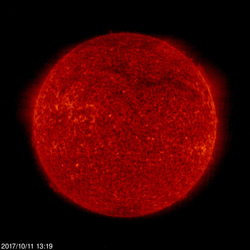 No sunspots were visible on October 8 through 11, and the last new sunspot appeared on September 25. Average daily sunspot numbers for October 5-11 dropped from 32.6 for the previous 7 days to 8.4. Average daily solar flux declined from 87.9 to 76.8. Geomagnetic activity also dropped but is now increasing. The average daily planetary A index went from 16.3 to 8.9, and the average mid-latitude A index went from 12.7 to 8.
No sunspots were visible on October 8 through 11, and the last new sunspot appeared on September 25. Average daily sunspot numbers for October 5-11 dropped from 32.6 for the previous 7 days to 8.4. Average daily solar flux declined from 87.9 to 76.8. Geomagnetic activity also dropped but is now increasing. The average daily planetary A index went from 16.3 to 8.9, and the average mid-latitude A index went from 12.7 to 8.







